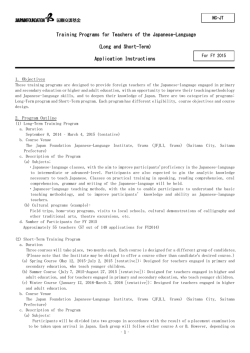
My co-worker is so sympathetic.
UNIT 1 My co-worker is so sympathetic. Communication Styles Getting Started Check the communication styles that apply to you. □ domineering □ inquisitive □ sympathetic □ accommodating □ outspoken □ diplomatic □ passive □ other: Reading &Discussions 1 Read the article below and get the main idea. Communication Styles: How You Say It One morning, while attending a staff meeting you feel that one of your co-workers is being too aggressive. Or after work one night, you are retelling the day’s events to your partner, but sense that you’re not being listened to — what is it that gives you such impressions? Although what we say is no doubt important in conversation, how we say it often gives as much, or perhaps even more, information. In research on how people communicate, the cross-cultural aspect has long been given significant focus. For example, it’s often said that Japanese do not make as much eye contact as Westerners. Also, according to sociolinguist Edward Hall, North Americans tend to maintain a greater distance than Latin Americans when they talk to a stranger. Another factor that has interested many researchers is gender. Examining videotaped 1 conversations between American, same-sex best friends, Deborah Tannen, another sociolinguist, found that women tended to have “their eyes anchored on each other’s faces,” while men “looked elsewhere in the room, periodically glancing at each other.” Tannen has further argued that men talk to compete and thus challenge each other in conversation, whereas women talk to create intimacy and thus value rapport. Some researchers, including Tannen, have attributed such gender divergence to patterns of socialization during childhood, while others have sought the answer in such fields as cerebral physiology or genetics. Whether natured or nurtured is still open to discussion; however, it can be said that communication styles are multi-faceted and that understanding your own and others’ styles might make you a better conversationalist. 2 Discuss the questions based on the article. Do you think the gender difference Deborah Tannen reported can be applied to people you know? Besides culture and gender, what other factors do you think affect one’s communication styles? Further Discussions Discuss the following questions in pairs or small groups. Use the box below for notes. 1. What do you think your communication styles or “habits” are? Do you think your own evaluation matches other people’s evaluation of you? 2. Think about your family, friends or co-workers. What are their communication styles? Why do you think that way? (e.g. She cuts people off. ) 3. Do you always have the same set of communication styles? If not, how do they change? tion. a s r e v n o c e although … yone in th , r se e n v se e a in s u e yo d h it u l w I agree … inc … pries into o Maybe you’re ther people’s b right, but … usiness. 2 Study Notes Today’s Discussion Communication Styles About the Topic Communication styles can be simply defined as styles in which one communicates with others. These styles can include both verbal and nonverbal aspects. For example, the tone and volume of one’s voice and frequent use of first names (e.g. You’re right, Kate.) are verbal; while gestures, facial expressions, eye contact, physical contact/distance, postures and initiative-taking are nonverbal aspects of communication styles. Often combined with each other, they can convey certain messages to others: Lack of eye contact and a feeble voice could be combined, for example, to give an impression that you’re not confident. Helpful Vocabulary To describe someone’s communication styles, you can use expressions such as … is a good conversationalist. , … includes everyone in the conversation. , … leaves [himself/herself] out of the conversation., … hears what [he/she] wants to hear. , … cuts people off., … pries into other people’s business., … always sits on the fence., … always butts in. and Having a conversation with [him/her] is like talking to a wall. I know someone who always butts in. You can also use such adjectives as aggressive, assertive, confrontational, decisive, diplomatic, passive-aggressive, domineering, indecisive, inquisitive , intimidating , overly agreeable , outspoken, persuasive, passive and sympathetic. I have a friend who’s really diplomatic. My co-worker is so sympathetic. 3 My boss always sits on the fence. Discussion Tip Conceding While Presenting Another Point To concede while presenting another point, you can use the following expressions: Maybe you’re right, but … おっしゃる通りかもしれませんが、…。 You may be right, but … おっしゃる通りかもしれませんが、…。 I see your point, but … おっしゃりたいことはわかりますが、…。 I know what you mean, but … おっしゃりたいことはわかりますが、…。 I agree with you in a sense, although … ある意味賛成ですが、…。 I [think/guess] you’re right, but … おっしゃる通りだとは思いますが、…。 That may be true, but … その通りかもしれませんが、…。 Maybe you’re right, but there could be individual variations. I see your point, but I think people from Kansai are more aggressive. UNIT 1 s My co-worker is so sympathetic. Words & Phrases Communication Styles … [彼/彼女]は…。 a good conversationalist 話し上手です sincludes everyone in the conversation 全員を会話に参加させます sleaves [himself/herself] out of the conversation s[He/She] sis 会話に加わろうとしません what [he/she] wants to hear 自分の都合のいいことにしか耳を傾けません scuts people off 人の話を遮ります spries into other people’s business 他人のことを詮索します salways sits on the fence いつもどっちつかずです salways butts in いつも横から口を出します sHaving a conversation with [him/her] is like talking to a wall. shears [彼/彼女]には何を言っても無駄です。 saggressive 攻撃的な sassertive 自己主張の強い sconfrontational 対立的な態度を取る sdecisive 決断力のある soverly 愛想の良すぎる/調子を合わせすぎる agreeable sdiplomatic sdomineering 如才ない [傲慢/支配的]な sindecisive 優柔不断な sinquisitive 知りたがる sintimidating 威圧的な soutspoken 遠慮なく物を言う spersuasive 説得力のある spassive 受け身の ssympathetic 思いやりのある spassive-aggressive 受動的攻撃性のある[怒りをはっきりと表現する代わりに、間接 的に態度で表すこと] srapport 調和 sposture 姿勢 Other scerebral physiology 大脳生理学 snurtured 養育された/後天的な smulti-faceted 多面的な sfeeble 弱い/微かな 4
© Copyright 2026
![[To acquire ability to think, act and transmit information in English] 1](http://s1.jadocz.com/store/data/000586615_1-30eae63e9a0d51495242f5e256cae010-250x500.png)



